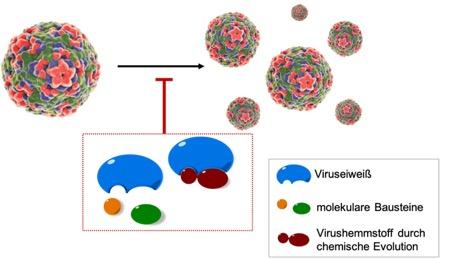New, Promising Ways of Fighting Viruses
News from May 10, 2021
A research team including scientists from Freie Universität Berlin is investigating novel antiviral drugs that can also inhibit the spread of coronaviruses
Researchers from the Institute of Pharmacy at Freie Universität Berlin, in collaboration with researchers at Katholieke Universiteit Leuven, have discovered a new process for developing antiviral agents for drugs. The research team studied viral proteins that are responsible for the survival and replication of viruses in human cells. The scientists were able to identify a mechanism that is able to assemble molecular building blocks into an effective inhibitor. The small molecular building blocks dock onto the virus protein, immediately combining to form an active ingredient that blocks virus growth in the infected cell. According to the researchers, the process can serve as a basis for the development of novel drugs. The method could also potentially minimize the spread of coronaviruses in the body. The findings were published in the journal Angewandte Chemie.
“In the battle against the coronavirus pandemic, high hopes are being placed on the massive administration of vaccines. However, the development of drugs against the virus has been neglected,” explains Prof. Dr. Jörg Rademann, a professor of medicinal chemistry at Freie Universität Berlin. There is good evidence indicating that the newly discovered mechanism of action will remain successful even with newly emerging virus variants and mutations and that it can inhibit the spread of viruses. Rademann goes on to explain that the innovative process is based on a natural biochemical process that was probably also important during the development of life. He says, “This also gives us an insight into the processes of molecular self-organization, which may have already played a role in the not yet animate, prebiotic world.”
Press Image
Mechanism of action of the new process, which can inhibit the reproduction of viruses in the human body through molecular self-organization.
Image Credit: Research team / Jörg Rademann
The image is available for journalists to download. It is free of charge when used in the context of the press release, provided the source is cited.
Further Information
Publication
Carolin Tauber, Rebekka Wamser, Christoph Arkona, Marisa Tügend, Umer Bin Abdul Aziz, Szymon Pach, Robert Schulz, Dirk Jochmans, Gerhard Wolber, Johan Neyts, Jörg Rademann (2021). Chemical evolution of antivirals against enterovirus D68 through protein-templated Knoevenagel reactions, Angewandte Chemie International Edition 2021, 60, pp-pp. https://doi.org/10.1002/anie.202102074.
Contact
Prof. Dr. Jörg Rademann, Freie Universität Berlin, Institute of Pharmacy, Tel.: +49 30 38-53272, Email: joerg.rademann@fu-berlin.de
